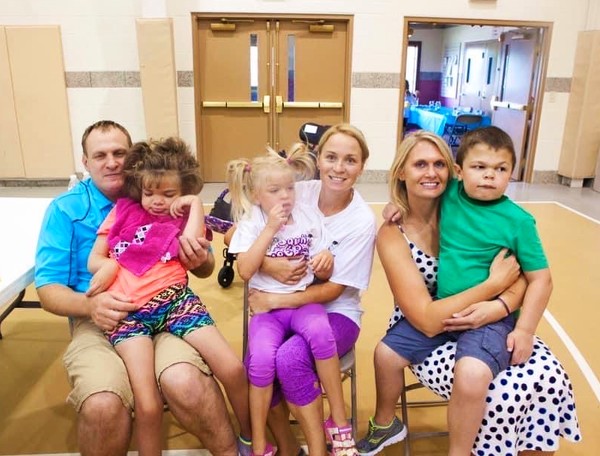
Kindergartner Brady Evers sticks out his tongue as he runs away with his kite during Coldwater Elementary School's celebration of National MPS Awareness Day on Monday.
FORT RECOVERY - Ava Kremer would have been a senior today. Her classmates returned the love, compassion and courage they learned from Ava by flying kites and playing games with fifth graders at the Fort Recovery football field.
"Do little things with great love," said Nikki Kremer, whose daughter died at 15 from mucopolysaccharidoses (MPS). "Whether it's reading a book or saying hello or patting an arm as you walk down the hallway, sharing a smile with others, you can make someone's day."
Kites were also seen gliding overhead on Monday morning at playgrounds in Coldwater and St. Henry schools, where many of the frolicking children were garbed in purple for National MPS Awareness Day.

First grader Kya Menchhofer picks up speed during Coldwater Elementary School's celebration of National MPS Awareness Day on Monday.
Coldwater seventh grader Carter Kanney and St. Henry seventh grader Adriane Schmackers were on hand in wheelchairs to witness to the simple yet powerful displays of childhood joy going on around them.
Natalie Kanney, Carter's mother, said the community has stepped up over the years to make her family feel loved, supported and cared for as they raise their son with MPS, a rare genetic disorder with no known cure.
"People never forget how you make them feel," she said.
For instance, the sight of children coming up to embrace Carter at the park never ceases to move her. Though he can't talk to them, he'll reciprocate their gestures by squeezing their hand or meeting their gaze.
"I still see kids doing that and I wanted to thank them," she said. "Obviously I know that it gives them something, but to watch them do that means so much to me as his mom and to his siblings."
"I would say the love we have experienced from all of our communities has been unbelievable," Nikki Kremer said. "The care and compassion that we receive daily, people are giving second to none."

Clint Kremer and his daughter, Ava; Lori Schmackers and her daughter, Adriane; and Natalie Kanney and her son, Carter, pose for a picture some years ago. Ava Kremer died in 2019.
In turn, Ava, Carter and and Adriane have forever touched the lives of their peers, teaching them, among other things, to be unafraid of people with differences.
"We kept her in school for as long as she was still teaching," Nikki Kremer said of Ava. "She was teaching others. That's how her light shined. She enabled her teachers and aides and peers … just the ability to interact with somebody with differences, somebody with disabilities."
Adriane still goes to school every day at St. Henry.
"They give her massages at school. They get outside and they go for walks. They're very good about getting them out into the art classroom or music or gym to watch the other kids," Lori Schmackers said. "That's where they get a lot of their enjoyment for school now."
Carter attends classes three days a week.
"I just got a picture of him holding a baby chick. This is why I still send him to school," said Natalie Kanney. "He gets those kinds of experiences. There's things you can't get at home when you interact with a bunch of people."

Kindergartner Josh Kremer flies his kite during Coldwater Elementary School's celebration of National MPS Awareness Day on Monday.
MPS are genetic lysosomal storage diseases caused by the body's inability to produce specific enzymes, according to National MPS Society. There are seven categories of MPS, including Sanfilippo, which Adriane has. Carter has Hunter syndrome.
The missing or insufficient enzyme, according to National MPS Society, prevents cells from recycling waste, resulting in the storage of materials in cells throughout the body.
"It builds up in their joints, in their organs, in their brain," Lori Schmackers said. "Adriane's builds up quite a bit in her brain. She's lost her ability to walk and her ability to talk."
Some people refer to it as childhood Alzheimer's disease, she said.
"They develop somewhat for about six years and then they plateau and then they regress," she added.
Lori Schmackers said she and her husband Chris noticed Adriane was not following the same developmental path as her two older siblings.
Nikki Kremer and her husband, Clint, observed symptoms in Ava "that didn't all go together," such as lots of ear infections, sinus infections, an enlarged head and delayed gross motor skills.
At a graduation party, a woman commented that Carter resembled her son who had died at age 3 from a form of MPS. Natalie and her husband, Dan, decided to have Carter examined by their pediatrician.
All three were eventually diagnosed with MPS.
The families met with an array of specialists and were prescribed various treatments. Carter receives enzyme replacement therapy.

Kindergartner Anna Beth Brosher runs with her low-flying kite trailing behind her during National MPS Awareness Day at Coldwater Elementary School on Monday.
"As the disease progressed Ava developed a lot of respiratory issues, so she could no longer swallow," Nikki Kremer noted. "When she swallowed mucus she would end up with pneumonia."
Nikki and her husband took Ava to a salt room in Celina. Anti-inflammatory salt crystals are infused in the room where it enters the body and breaks up the mucus, she said.
"She thrived in that environment. After she passed away we opened a salt room in Fort Recovery," she said.
"I still bring Adriane there," Lori Schmackers pointed out. "I think it saved Adriane from some hospital stays."
The three families have found support in one other and together have raised awareness of MPS.

Kindergartner Isaac Wolf flies a kite during National MPS Awareness Day at Coldwater Elementary School on Monday.
